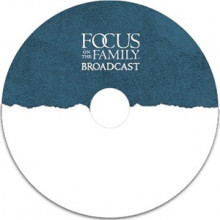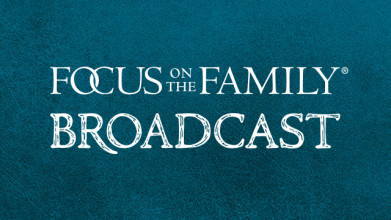
The War of Words
In this Adventures in Odyssey drama, a carelessly uttered word from Eugene creates havoc as it becomes the fashionable insult, resulting in a lesson about the power of words.
Home » Episodes » Focus on the Family Broadcast » Finding Space to Connect With God
Preview:
Kathi Lipp: Failure is natural. Pain is natural, but when we stop going to God with it, when we trying to take care of things on our own, we only have so much reserve. And so this was just an opportunity to say, I need to make sure that God isn’t the extra at the end of the day, that that’s my sustenance. That’s what I need. And why do I k- have to keep learning that lesson over and over and over again?
End of Preview
John Fuller: Kathi Lipp joins us today on Focus on the Family, along with her friend and co-author, Cheri Gregory. Your host is Focus president and author Jim Daly, and I’m John Fuller.
Jim Daly: Uh, John, what does it look like for you to get away, like for a retreat?
John: Oh, well that would be like mountains and, uh-
Jim: (laughs).
John: … time with a book and no cell phone. That’s- that’s rest and- and relaxation for me.
Jim: You know what’s amazing? Jean just did a retreat with a handful of girlfriends.
John: Yeah.
Jim: And they got out to the mountains, and they were able to kind of relax and study the word pretty deeply. Not everybody has that opportunity.
John: No.
Jim: And that’s a great thing.
John: It’s okay.
Jim: But I love the fact that the timing of this, with Jean’s experience and our guests today, talking about how you can have that retreat environment without necessarily having to go spend a lot of money-
John: Hmm.
Jim: … or drive to the mountains or something like that. I’m looking forward to this discussion because we all need to think about our relationship with the Lord, where we’re at, where we need to go. And the best way to do that is silence, right, time to just think. And we’re gonna really help you better understand how to do that each and every day.
John: Yeah. I used to pray that God would speak, and now I say, “Lord, help me listen.”
Jim: Mmm.
John: Because I believe he speaks a lot more than I listen.
Jim: Mm-hmm.
John: So, I’m really glad that we have, uh, Kathi and Cheri here. They’ve been here, uh, a number of times before. They’re very popular speakers and authors, and they’ve written a book together. It’s a devotional titled An Abundant Place: Daily Retreats for the Woman Who Can’t Get Away. And we have copies here at focusonthefamily.com/broadcast.
Jim: Well, welcome back to both of you.
Kathi: Thank you.
Cheri Gregory: Thanks so much. It’s great to be here.
Jim: Yeah, it’s so good to see you. You are always so cheery and so effervescent.
John: Mmm.
Jim: We love it.
John: Oh, that’s a good word.
Jim: Yeah, you like that?
Kathi: I- I love that word.
Jim: Yes.
John: (laughs).
Kathi: I don’t know that I’ve ever been called that before.
Jim: Bubbly.
Kathi: Yes.
Jim: But we love it. And you guys bring such great wisdom. Uh, let’s go there. You speak to a lot of women through the ministry that God’s given you. It, what’s the most common thing you hear from women, uh, about, oh, just the demands? I have a good friend who was just telling me she raised her girls in the ’70s and ’80s, and she goes, “I don’t really remember that part of my life.”
Kathi: (laughs).
Cheri: (laughs).
Jim: You know, I think I understand that, but that’s kind of how a lot of women feel.
Kathi: That’s- that’s exactly what my mom says. She does not remember the ’60s or the ’70s.
Jim: (laughs).
Kathi: And- and, you know, I think the number one thing that we hear from women is that they are overwhelmed. And in fact, we wrote a book about it. You g- we talked-
Jim: Right.
Kathi: … to you guys about it. And this devotional is a response to it because, you know, it, wherever you are in your life, whether you’re at home with kids, you’re working full time, there is so many demands on all of us.
Jim: Sure.
Kathi: And to have the opportunity to just kind of pull back and get away, it’s a luxury for a lot of people, but it’s also a necessity.
Jim: Yeah.
Kathi: So that’s what we were trying to figure out.
Jim: And in that context, I mean, it is good. Like Jean had a wonderful experience-
Kathi: Mm-hmm. Yeah.
Jim: … last weekend. And it w- was really enjoyable to her. She said she laughed a lot, she cried.
Kathi: Mm-hmm.
Jim: You know, the girls really bonded.
Kathi: Mm-hmm.
Jim: But for the woman that struggles carving out that kind of time because she’s so busy, can you really, um, seek the Lord and hear from the Lord without that kind of retreat experience?
Cheri: Well, you know, for some women, it, they’re at a stage of life where the, even the thought of getting away is more overwhelming.
Jim: Right, it’s more work.
Cheri: Because, yeah, there’s all the preparation that has to happen. And so to be able to carve that time out, to be able to set aside some time to, uh, pull together, um, some things to make it meaningful and retreat-like. Uh, you know, we like to, you know, pull together a blanket or a favorite drink, favorite scripture, to have a space, to have a place in the house for it. Uh, for me it’s a prayer chair, uh, where my family knows. Now the cat does not know.
Kathi: (laughs).
Jim: (laughs).
Cheri: Rafiki does not respect my retreat time.
Jim: Hey, we could take care of that cat for you.
John: (laughs) Yeah.
Cheri: But my family knows that if I’m in my prayer chair, I, you know, don’t bother mom unless there’s blood or something like that.
Jim: (laughs).
Cheri: And so to be able to create that space and time-
Jim: Yeah.
Cheri: … rather than waiting, okay, someday I’ll get away, someday I’ll get away. Well, two, three, four, five years can go by. Whereas to be able to do that, we believe on a daily basis, to carve out that little bit of time is so important-
Jim: When you-
Cheri: … and can really lessen that, uh, that feeling of overwhelm.
Jim: And just for that specificity, how much time is that for you?
Cheri: You know, sometimes it’s five minutes.
Jim: Right.
Cheri: Sometimes it turns into lingering for a half an hour or an hour or more, but I don’t want to get hung up on the time, because so many-
Jim: Yes.
Cheri: … at least those of us who are recovering perfectionists-
Jim: Yeah.
Cheri: … we get hung up on the time.
Jim: Right.
Cheri: If it’s not an hour, it doesn’t count. And it’s like any time with God totally counts.
Jim: Right.
Cheri: And also the person who’s like, “I’m not even gonna bother to try if I can’t do it right,” find that space, create that space, do it for a little period of time and it’s gonna grow. Mm-hmm.
Jim: Yeah. And you’re not saying it, you know, for that retreat experience, that’s a good thing. That’s good to carve out that time.
Cheri: Yeah.
Jim: But how to have that experience more frequently, which would be good.
Cheri: Mm-hmm.
Jim: So that your faith is deepening. That’s what you’re saying. And it doesn’t take a lot.
Cheri: Yeah. It’s not either or, it’s both.
Jim: Yeah, that’s good. Um, let me ask you Kathi, you- you have an acronym, SPACE, uh, that really helps people to learn meditation and scripture application. Uh, what’s the, uh, acronym stand for? Describe it for us.
Kathi: Yeah. So, what we’re asking is for space. And I think, you know, as women, we really desire space in our lives, whether it’s in our schedule-
Jim: It’s like the number one commodity.
Kathi: It really, really is.
Jim: (laughs).
Kathi: And so we took that, and we just said, “Okay. What is a daily ritual that we can put into our lives that will just take a few minutes but can help us go deeper with God?” And it’s that consistency, you know. It’s that daily consistency. So, S is for speak. So, this is just, if you’re taking a portion of scripture, reading it aloud three times. And three times may seem a little weird. And I’m not trying to say, you know, do something ritualistic. This doesn’t, you know, make … There’s no magic number, but for me, to really meditate on it three times, I can really start to take that portion apart. Um, ponder. Sit quietly. Why is God bringing this verse into my life right now? Like is there something going on in my life? Is there something specifically I need to be listening to? So just giving some opportunity. I love what you said, John. You know, it’s, you know, God speak to me. Well, I need to listen. I, that’s what I need, is I need to sit and be quiet and listen. Act. Is there an action that God is asking me to take? Is there something that I need to be doing that I’m not currently doing? Or is there something I need to be stopping that I am currently doing? Um, commit. What has God committed to do? I think this is so interesting, to think about it like, what does God say his commitment is in this word? Look for what the scripture reveals about God, who he is and what he promises.
Jim: Mm-hmm.
Kathi: And then finally, express. I take a moment to express to God, you know, how this verse is hitting me, what I’m learning, how it makes me think and how it makes me feel.
Jim: Yeah. That’s well said. Uh, Cheri, let me ask you. It, this is a devotional basically, and we want to highlight a few of the stories, and certainly we’re not gonna cover it all. So, for the listener, for the viewer, you’ve got to get a copy-
Cheri: Mm-hmm.
Jim: … because there’s so much good stuff in here. But you, uh, used, uh, a certain type of grass to get an illustration.
Cheri: Yes (laughs).
Jim: Is it kudzu or which g-
Cheri: It’s called Kikuyu grass.
Jim: Kikuyu, okay.
Cheri: And-
Jim: I gotta get my grass knowledge built up here.
Cheri: (laughs).
Kathi: (laughs).
John: You don’t want this one though.
Jim: (laughs).
Cheri: I know. I live on an old boarding school. Um, it’s an old military base that’s become a boarding school. And, uh, we were doing some renovation on our house, and we opened up, uh, we took out this windowsill, and there was literally grass growing inside the wall, like sprouting out-
Jim: That’s crazy.
Cheri: … everywhere. It was bizarre. It was like something out of a horror film, because there was clearly no- no light on the inside. And it’s, it turns out it’s this really invasive kind of grass and it’s considered a federal noxious weed.
Jim: That doesn’t sound good.
Cheri: No.
Jim: (laughs).
Cheri: And, you know, one of the things about writing devotionals, and, um, is that it gives us a chance to think about these little experiences in our everyday life and to really listen to what God is telling us about them. And so, you know, I didn’t pay much attention to it, and then I feel the Holy Spirit tapping me on the shoulder and saying, “There’s a life lesson for you here, Cheri.”
John: Mmm.
Cheri: There’s a lot of things in your life that become like Kikuyu grass, you know. There’s that Christmas season, where you were just gonna do a few things and then the calendar exploded, or, you know, there’s you just gonna do this little bit in the house, and then suddenly it’s a home renovation. And so it became this- this metaphor for boundaries.
Jim: Mmm.
Cheri: And realizing that on my own, I will say yes to everything.
Jim: Mm-hmm.
Cheri: I’m interested in so many things. Everything looks so good.
Jim: Yeah.
Cheri: But one of the things about Kikuyu grass is it grows underground, and then it jumps up, and you realize it’s invaded everywhere and taken over. And, um, that’s what these-
Jim: Those are the yeses.
Cheri: Those are the yeses-
Jim: Mmm.
Cheri: … that sprout up and take on that life of their own, that end up growing inside your wall, where you’re like, wait, I didn’t agree to thi- … I said yes to this tiny thing, and then suddenly people say I’ve said yes to everything.
Jim: Let me ask you this, and Jean has done a far better job than she used to.
Cheri: Mmm.
Jim: But one of the, one of the observations I would have had, you know, 10, 15 years ago, is it’s this like ricochet effect, where she said yes to too much.
Cheri: Yeah.
Jim: And then she is condemning herself-
Cheri: Yeah.
Jim: … for not having time to do the yeses.
Cheri: Mm-hmm.
Jim: And it- it’s like this bang, bang, bang, bang.
Cheri: Yeah.
Jim: The- the guilt.
Cheri: Yeah.
Jim: That I can’t do all the yeses, but I should be able to do all the yeses.
Cheri: Yeah.
Jim: How do you, uh, kind of unpack that for your own health?
Cheri: You know, I, uh, my tool is really a little bit strange, but I’ve started a journal, and I literally titled it I Was Wrong. And it’s because when I take the time and I ask God for wisdom and say, “Okay, Lord, of all of these possibilities, which ones are invitations from you, and which are possible invasions from these noxious”-
John: From others (laughs).
Cheri: … “weed like things in life, that the yeses that I’m not supposed to be saying.”
John: Yeah, wow.
Cheri: And so then I keep record of, okay, I wanted to say yes to this. And here’s the thing. Sometimes I’m like, I want to do it anyways. Even if God’s like, “This is a noxious weed.” Fine, I’m gonna do it anyways. Well, then I have to journal-
Jim: (laughs).
Cheri: … and be like, “It turned out terribly.”
John: (laughs).
Jim: Yeah.
Cheri: It was a very bad idea again-
Jim: Yeah.
Cheri: … to disobey God. I should have listened. And it’s very humbling.
Jim: Yeah.
Cheri: It is so, it, to see in black and white, all those times where I was like, “I’m gonna say yes. It’s gonna turn out okay this time.” And it turns out, no, it’s more of this Kikuyu grass, and it’s choking the life.
Jim: That’s good. That’s a good analogy.
Cheri: Yeah.
Jim: Kathi, you- you speak to the issue of entitlement-
Kathi: Mmm.
Jim: … and how to, um, overcome that. Uh, w- uh, w- describe that, how you s-
Kathi: Yeah. So, I, we both apparently have very strange practices.
Cheri: (laughs) Yeah.
Kathi: Because one of the things that I have come to need in my life is a lot more gratitude. Can we just all admit the past couple years have been hard?
Cheri: Mmm.
Kathi: For a lot of people-
Jim: Sure.
Kathi: … in a lot of different ways. And I realized I was getting this real root of entitlement in my life. Life shouldn’t be this way. It shouldn’t be this hard. I should be able to do the things I want. All this kind of stuff. And I realized that I was not a really nice person to live with and I needed to make some changes and that I needed to say thank you, I needed to be actively pursuing gratitude in my life. But we were in lockdown. And so what-
Jim: (laughs).
Kathi: … I finally started doing was I’d go out to the chicken coop each morning, and Brie would always l- we … All of our chickens are named after cheeses.
Jim: (laughs).
Kathi: Um, you can tell the priorities in our house.
Jim: You know, you know cheese doesn’t come from chickens.
Kathi: I do know that, yes.
Cheri: (laughs).
Jim: I was just making sure.
Kathi: Right. Okay. Yes. I’ve got that anatomy and cooking down. Um, it’s safe to eat at my house.
Jim: Right.
Kathi: Uh, but, you know, Brie would always l- lay the first egg and I would just say, you know, “Thank you, Brie. This- this egg is gonna be amazing in tomorrow’s breakfast.” And it seems so ridiculous, but I realized as I was practicing gratitude with the lowly chickens, I was actually increasing it in other parts of my life.
Jim: Huh.
Kathi: I was noticing what God was doing in my life. I was noticing the abundance he had given me in other areas. I was being more grateful towards my husband. I was being more grateful towards people on the internet. Miracles abound, you know. I just realized this simple act of saying thank you, uh, to every situation was helping me find the good.
Jim: Mmm.
Kathi: Where before, I was purposely looking for the problem.
Jim: Well, and what you’re saying there is attitudes are choices.
Kathi: It-
Jim: We choose to have that attitude.
Kathi: I can’t choose my circumstances.
Jim: Yeah.
Kathi: I can choose how I can respond to my circumstances.
Jim: Absolutely.
John: And I like how in the book, you- you said, see how many times you can thank others for something, even if it begins with a chicken, I guess.
Kathi: Yeah.
Jim: (laughs).
John: I was with my daughter last night, and I thought, she is so nice to the waitstaff here.
Kathi: (laughs).
John: Well, she is in the food service industry herself.
Kathi: Oh.
Cheri: Oh.
John: So she’s super attuned to-
Kathi: Yes.
John: … people that aren’t grateful, that are entitled and cause problems. So, this is good stuff. It’s, uh, very, uh, practical. And our guests today on Focus on the Family are Cheri Gregory and Kathi Lipp, and they’ve written this terrific devotional, An Abundant Place. And we’d invite you to contact us to get your copy. Our number is (800) the letter A, and the word FAMILY, or stop by focusonthefamily.com/broadcast.
Jim: Cheri, in the book, uh, Abundant Place, you talk about your quirky house.
Cheri: (laughs).
Jim: So, I don’t know, it’s obviously not the abundant place, but what- what’s up with your-
Cheri: Oh, this is one of my favorite stories. This one I actually, comes from about like 10, 15 years ago, when we first moved there. When we first moved to the, um, boarding school where we live, we moved into a barracks, a former Ar- Army barracks. And so it was like-
Jim: Where every wife wants to live.
Cheri: Exactly.
John: (laughs).
Cheri: Like 1940s. Uh, but I mean it had a view of the Pacific Ocean, panoramic views.
Jim: Okay. That’s good.
Cheri: So, we lived in barracks. We had this view. And so we were leaving. And Kathi and Roger were gonna come stay for a little bit. And as the time got closer, I thought, oh, there’s a few things I need to jot down for her about this house.
Jim: (laughs).
Cheri: I ended up with a five-page typed list of things she needed to know, like, you know, that the hot water and cold water in the shower were opposite. Or if you used two appliances in the kitchen, you’d throw the circuit breaker. Or there was a particular window if you opened, it would fall out into the bushes, and you’d have to run outside and pick it back up again.
John: It’s starting to sound like a horror film.
Cheri: It, you know. And so-
Jim: Well it’s a polite way of saying don’t come.
Cheri: (laughs).
John: (laughs).
Cheri: I- I just thought, you know, and so she emails me back and she’s like, “Your house scares me.”
Jim: (laughs).
Cheri: And I’m like, she’s a writer. She should know the difference between scary and quirky. Come on.
Jim: (laughs).
Cheri: Like for me, all of this was normal. And I realized, this was one of those times the Holy Spirit tapped me on the shoulder and was like, “What else has become normal for you, Cheri?” What would be like if you made a list about yourself and what people have to get used to when they get to know you and do life with you, you know? This house didn’t get this way overnight. It was over time. And I suddenly thought, if I were to make a quirk list of things that I expect people to adapt to, it would be really, really long. And my natural reaction to that sort of thing is I’m gonna fix it. I’m gonna go buy a ton of self-help books, and I’m gonna overhaul my character in a few nights, and then I’ll be back to being just fine.
Jim: Mmm.
Cheri: And really made me realize, no, this is the kind of thing, where just like I did, after they visited, I made a fix it lists, and I handed it over to our landlord.
Jim: (laughs).
Cheri: That is a reminder to me that I need to hand over my fix it list for myself to God.
John: Hmm.
Cheri: That I need, let’s see, what is that word? A savior (laughs). Not myself, not more self-help. And, um, sometimes, you know, even professional help, whether it’s a spiritual guide or a- a mentor or, um, a counselor to help, you know, really drill down into things.
John: Mmm.
Jim: Uh, Kathi, what was going on when you decided to make pancakes? A- we’re getting hungry, right, John?
John: I envy them, yes.
Cheri: (laughs).
Jim: Eggs and pancakes.
John: And cheese.
Kathi: So many egg stories, I know.
Jim: I’m ready to go for lunch or dinner.
Kathi: You know, you know, it’s- it was a- a couple of years of a lot of hard things, and we were just, you know, I was getting through it. I was spending time with God. These challenges were coming up. But after a lot of hard time, you know, it’s easy for things to drop off your routines. So for me, exercise always goes first. That’s always the easiest one to get rid of, because nobody’s gonna notice, right?
Jim: (laughs).
Kathi: And then, you know, maybe some other healthy habits. And then what I’ve noticed is that if I am not taking really good care of myself, that it’s very easy for me to find excuses to be too busy to meet with God. And I’ve gotten into those places. And I can fake being okay for a really long time.
Jim: Mm-hmm.
Kathi: And this morning, I was just, I was going to do pancakes. We had had a hard week. I make great pancakes, put a little vanilla in. They’re amazing.
Jim: Mmm.
Kathi: I know, I’m making you hungrier.
Cheri: Mmm, mm-hmm.
Jim: Yeah.
Kathi: And I tripped over the dog. Uh, the carton of eggs went everywhere on the kitchen floor, and so did I. I just, I sat there on the kitchen floor, and I just cried.
Jim: Mmm.
Kathi: And I cried, and I cried, and I cried, and I scared the dog. You know it’s bad when you cry so much, you scare the dog. And it was, I realized that I had been trying to handle too much stuff on my own, and not … Failure is natural. Pain is natural. But when we stop going to God with it, when we trying to take care of things on our own, we only have so much reserve. And so this was just an opportunity to say, “I need to make sure that God isn’t the extra at the end of the day, that that’s my sustenance, that’s what I need.” And why do I k- have to keep learning that lesson over and over and over again? You know, I’m a woman in my 50s, and sometimes, I- I’m just being honest, sometimes the, I get to the end of the day and I’m like, “I’ve spent no time talking with God today.” And here’s what I know. When I talk with God, my, uh, everything, it doesn’t get necessarily get easier in the moment, but I know that there is healing taking place.
Jim: Mm-hmm.
Kathi: And why do I want to skip the healing? Why do I let my brain convince myself I’m too busy to be with the most important thing in my life? And so this was just, uh, a devotion about unpacking those feelings that we often feel, as humans, as women, that life is too busy to do the most important thing.
Jim: Yeah.
John: Mm-hmm.
Jim: And I think it’s probably rooted in our sin nature, right?
John: Mmm.
Kathi: It, yeah, absolutely.
Jim: The enemy in our own flesh works against us spending that time with the Lord.
Kathi: 100%.
Jim: That’s part of it. Hey Cheri, I want to ask you about the strawberry farmer, because that really helped you in your fruitfulness, uh-
Cheri: Yes.
Jim: … understanding. What happened there?
Cheri: You know-
Jim: It’s all about food, girls, you know.
Cheri: (laughs).
Kathi: Yeah, exactly.
Jim: Right, great.
John: There is a definite theme.
Cheri: (laughs) Um, well we do live just outside of Watsonville, California, which has, uh, lots and lots of strawberries get g- um, grown there. And so we first moved into the house we’re in now, and these entire flats of strawberries would just show up out of the blue. And we were like-
Jim: Like on your porch?
Cheri: Yeah, on our front porch.
Jim: That’s pretty cool.
Cheri: Like I would take them in, and … Oh, absolutely. We made jam and strawberry shortcake. But I’m like, what’s happening? And it was just the local farmer’s way of sharing his bounty.
Jim: Oh, that’s great.
Cheri: And it was wonderful and delicious. And so strawberry season, at least where we’re at, is March through October, and waiting for strawberry season is the other six months of the year. Um, but, you know, there’s a, uh, verse in Psalm 1 actually that talks about bearing fruit in season. And w- waiting for strawberry season was a really great lesson for me because I love being productive. It’s always been the way that I have determined my worth.
Jim: Mmm.
Cheri: I’ve never been popular, but I have been necessary.
Jim: Oh, man.
Cheri: And in order to stay necessary, you have to always be producing. And so I realized, I have mistakenly associated fruitfulness with healthy spirituality, and assumed that if I wasn’t producing fruit, it meant that I was either spiritually dead or something, you know, far worse than that. But God designed us to have seasons of fruitfulness and seasons of fallow. And it was wonderful to realize, well, just a second. The scripture actually says that whatever they do, and this is those who are, who are following God’s ways, prospers. And to realize that I don’t have to always be productive to always be prospering.
Jim: Wow.
Cheri: That even though the rest, and of course the, the Sabbath is a symbol of- of the kind of rest that we need, um, even that is something that God has given to us. And- and when it comes down to it, fruitfulness is his gift to us. I- I kind of got mixed up, like all the fruit producing was, I thought was me giving him a gift, and it’s like, no, no, fruit is always his doing, just like the rest is also his doing, so.
Jim: Well, I love that idea of there-
Cheri: Yeah.
Jim: … is a time for production and a time for taking care of the soil.
Cheri: Yes.
Jim: Getting it ready for production.
Cheri: And- and those of us who are producers-
Jim: Yeah.
Cheri: … it feels like laziness.
Jim: Right.
Cheri: But what I realize is when it’s not time to produce fruit, it’s time to grow deeper roots.
Jim: Yeah, that’s so good.
Cheri: And to really get into the living water.
Jim: Mmm.
Cheri: And so, I still struggle with it. I haven’t overcome it completely, but in, I’m- I’m getting much more at peace with those times that look barren, that look like, oh my goodness, like lazy is one of the worst possible words in my family, but it’s like, no, I’m just gonna trust that the fruit will come in its season.
Jim: You know, given that, Kathi, I wanted to ask this question, because so many women are gonna identify with this, and even that head thought of lazy, it fits this.
Kathi: Mm-hmm.
Jim: And that’s the- the destructive self-talk.
Kathi: Oh my goodness.
Jim: And you mentioned that. And how-
Kathi: Yeah.
Jim: I mean, again, how does a woman get into a better spot?
Kathi: Yeah. Well, you know, weight is something I’ve struggled with my entire life. You know, I was a 10-pound baby. I had no chance, you know. It was, it’s some- it’s just been a struggle my entire life. And it’s something that I have repeatedly failed at. And let’s be honest. When you failed at something so many times, um, it’s very hard to say, “No, I’m gonna do it again. I’m gonna do it again. I’m gonna do it again.” You know, Proverbs 24:16 says, “Though the righteous fall seven times, they rise again, but the wicked stumble while calamity strikes.”
Jim: Mmm.
Kathi: And, you know, I- I love that idea of getting back up again, again and again and again. And we only fail if we’re not willing to try again. And so what I’ve had to do with my own self-talk, because let’s just say, you know, we- we are in, everybody in this room is in the public eye to a certain extent, and people feel very free to comment on every aspect-
Jim: (laughs).
Kathi: … of our lives.
John: Mm-hmm.
Kathi: And it, we have to figure out whose voices are we giving weight to.
Jim: Yeah.
Kathi: And I’ve also come to understand, one of the most important decisions I can make is who am I doing life with. Am I doing life to please people on the internet or am I finding those women who have failed seven times, but they keep-
Cheri: Mmm.
Kathi: … getting back up? And those are the people I want to hear the stories from.
Jim: Yeah.
Kathi: Those are the people I want to do life with.
Jim: Yeah. And it’s really good. Yeah. Roger, your husband-
Kathi: Yeah.
Jim: … lost his mother not long ago.
Kathi: Right.
Jim: I’m sorry to hear that. Uh, you share a beautiful tribute-
Kathi: Mm-hmm.
Jim: … that happened. Explain what went on.
Kathi: Yeah. So, it was heartbreaking. You know, she was a woman who was full of life, and she loved her three boys tremendously. And we just, we couldn’t figure out what to do to … We couldn’t have a funeral. We couldn’t be with his brothers. We couldn’t be with our family.
Jim: Mm-hmm.
Kathi: And so what we decided to do instead was, um, Betty was known for her love of butterflies. Like her boys always knew, if they couldn’t figure out what to get her for Christmas or her birthday, buy something with a butterfly on it.
Jim: (laughs) That’s good.
Kathi: She would be fine with it. And, um, so we decided instead of buying a trinket or something, because we live on a mountain, one of the best things that we could have done was to plant a butterfly garden.
Jim: Mmm.
Kathi: And so, uh, there are certain flowers that attract the butterflies. And it was just our opportunity, you know, she loved the representation of butterflies because she had been through some really hard things in her life, and butterflies represented new life to her.
Jim: Being able to change, the metamorphose.
Kathi: Being able to change.
Jim: Yeah.
Kathi: Being able to do something different than what you did before. And as women, you know, it’s so easy to get stuck in a place and not make changes in your life that are for the good, that are pursuing God. And she was such a great example of being able to pursue God in her life.
Jim: Mmm.
Kathi: So, we planted a butterfly garden, and we’ve got a little sign that says, “Betty’s Butterfly Garden.”
Jim: (laughs) That’s good.
Kathi: And, um, it’s our reminder-
Jim: That’s sweet.
Kathi: … that God has a new plan and new hope, and Betty is now with the people she loves so dearly, her husband, her sister. And that there is always a new hope for those of us who believe in Christ.
Jim: Yeah. And that- that’s a great place to end today, that there is great hope in Christ. That is the hope.
Kathi: The hope.
Jim: And the- the lessons that you’ve learned and the way you’ve put this into the devotional is great.
Kathi: Mmm.
Jim: And I just can’t wait to get it for Jean. I want Jean to-
Kathi: Mmm.
Jim: … participate. She had such a great experience at that retreat, but it’s something that women can enjoy regularly, and that’s the key theme that both of you have brought today. Thank you for being with us.
Kathi: Thank you for discussing it with us.
Jim: It’s so good.
Kathi: This has been so much fun.
Jim: And so helpful. I’m telling you, if- if these are places where you have struggled, that, uh, destructive self-talk, the guilt for finding space to make sure you’re in a good spot, um, you need to get this devotional so that you can keep the positive things moving toward Christ. And if you can give a gift of any amount, uh, we’ll send you a copy of the book as our way of saying thank you for being a part of the ministry, and we’ll help more couples, uh, do even a better job in their marriages, in their parenting, and that’s what it’s all about. So, thank you.
John: Yeah, donate as you can, and get a copy of this book. And, uh, you can also set up a time for one of our counselors to give you a call back. Cheri mentioned, uh, maybe sometime somebody from the outside, uh, can speak into your life, and we have some great, caring Christian counselors. Our number is (800), the letter A, and the word FAMILY. (800) 232-6459 or stop by focusonthefamily.com/broadcast. Well, we hope you have a great weekend, and that you plan to join us again on Monday, as we hear from Carey Casey. He’ll have an inspiring message about racial unity and Christian love.
Preview:
Carey Casey: You can preach. You can have all of the wonderful thoughts and reason. They will know that we are Christian by our love.
End of Preview

Kathi Lipp is the author of many books including Ready for Anything: Preparing Your Heart and Home for Any Crisis Big or Small, Clutter Free, Hot Mama: 12 Secrets to a Sizzling Hot Marriage, The Get Yourself Organized Project, The Husband Project and You Don’t Have to Try So Hard. She is a frequent guest on radio and TV, and host of the podcast Clutter Free Academy. Kathi and her husband, Roger, are the parents of four young adults in Somerset, Calif. Learn more about Kathi by visiting her website, www.kathilipp.com. You can read more from Kathi on her blog.

Receive Kathi and Cheri's book An Abundant Place for your donation of any amount!

In this short sample of their book An Abundant Place , Kathi Lipp and Cheri Gregory offer you a few simple tools to find time to connect with God.

Visit our online store and purchase a CD of today's program for yourself or to share with a friend.

In a discussion based on their new book, Overwhelmed , Kathi Lipp and Cheri Gregory offer advice for reducing stress, organizing your schedule, learning to say "no" to unnecessary commitments and increasing your capacity for joy.

Authors Kathi Lipp and Cheri Gregory encourage women to stop striving for perfectionism and to cling to the truth that God accepts them for who they are, not what they do. (Part 1 of 2)

In a discussion based on their book Overwhelmed , Kathi Lipp and Cheri Gregory explain how you can find peace when dealing with people who are "crisis creators" or who overwhelm you with their personality. (Part 1 of 2)

Amy Carroll and Cheri Gregory offer hope to women who feel overwhelmed by the pressure of obligation and expectation, encouraging them with the reminder that they can find daily peace by resting in the love of God and embracing their true identity in Jesus Christ.

Kathi Lipp discusses the scriptural reasons why we should pray and shared how using the Word of God in her prayers has helped improve her marriage, parenting and general life situations.

Giving Thanks - A spiritual insight from Focus on the Family leadership.

Remember how God has met you in the past issues of life. He will not fail to do this again for you.

His words remind us (again) that, by His death, He rescued us from the fear of our death. Therefore we are released from having to "cower through life, scared to death of death."

In this Adventures in Odyssey drama, a carelessly uttered word from Eugene creates havoc as it becomes the fashionable insult, resulting in a lesson about the power of words.

This discussion offers a preview of Volume #16 “Cultures in Conflict” from the That The World May Know video series, available below.

Debra Fileta will help couples better understand the four seasons of healthy relationships, what to expect during each one, and how to carefully navigate them for a stronger marriage. (Part 1 of 2)

Larnelle Harris shares stories about how God redeemed the dysfunctional past of his parents, the many African-American teachers who sacrificed their time and energy to give young men like himself a better future, and how his faithfulness to godly principles gave him greater opportunities and career success than anything else.

Amy Carroll shares how her perfectionism led to her being discontent in her marriage for over a decade, how she learned to find value in who Christ is, not in what she does, and practical ways everyone can accept the messiness of marriage and of life.

Jonathan McKee offers parents practical advice and encouragement in a discussion based on his book If I Had a Parenting Do Over: 7 Vital Changes I’d Make.